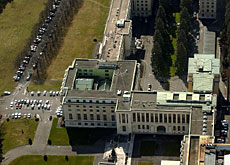Switzerland goes in search of better press

Raphaël Saborit, the foreign ministry's new point man for the international press, explains to swissinfo how he aims to raise the country's profile abroad.
The former journalist says he hopes to increase foreign coverage by tapping into Swiss embassies and flagging up the activities of international Geneva.
After a short stint at the bi-monthly Bilan business magazine, the former adviser to cabinet minister Pascal Couchepin has re-joined the federal administration.
The foreign ministry has charged him with fostering relations with the international media. He is based at the Swiss Mission to the United Nations in Geneva.
swissinfo: What are your main tasks?
Raphaël Saborit: My job is to maintain relations with the international press, whether this be in Switzerland with correspondents based in Geneva, Bern or Zurich, or with editors in their respective countries, mainly in Europe.
I also intend to work with Swiss ambassadors so that they nurture their contacts with the big media players in the countries where they are based.
swissinfo: What lies behind the decision to set up this post?
R.S.: [Foreign Minister] Micheline Calmy-Rey wanted her press office to pay more attention to the foreign media. In a globalised world, Switzerland needs new markets, friends and visibility. By appearing more frequently in the international press, the country increases its presence and, consequently, its influence.
Diplomatic battles are also fought in the media. It is important for foreign ministers to let their views be known and to watch over their country’s image abroad. And in a democracy, even more so in a direct democracy, the necessity to explain foreign policy goals demands a certain amount of transparency.
swissinfo: How do you intend to go about your work?
R.S.: Some 200 journalists from around the world work in Geneva where they cover stories on the international organisations that are based there. But these journalists also touch on Swiss topics, including foreign policy. It’s a question of being able to better respond to their demands.
swissinfo: In the past Switzerland has taken a low-key approach to defending its interests abroad. Has there been a change of heart?
R.S.: Switzerland is a small country in terms of population and area. But its economy allows it to figure among the top 20 trading nations and it is the leading financial centre. Switzerland is also among the ten biggest foreign investors in the world. On a political level, international Geneva lends Switzerland an aura, a visibility that greatly exceeds the relative size of the country.
For this reason, it is important that our nation gets more coverage in the international press. Foreign journalists should not just talk about Switzerland when there are natural disasters or financial scandals.
Swiss foreign policy deserves better attention because the country has strengths and is listened to when it pronounces, for example, on international law, human rights or international humanitarian law.
swissinfo: In what ways has Switzerland been losing out?
R.S.: For example, Switzerland does not figure among the numerous statistics of the European Union, because we are not a member. If you flick through the pages of the big international newspapers, there are many articles comparing the situation in different countries based on these statistics. You end up forgetting about Switzerland, while at the same time hearing a lot about Ireland and Austria, which are similar-sized countries.
One of my tasks, therefore, will be to ensure that Switzerland features more frequently in European newspapers.
swissinfo: You are based in the heart of international Geneva. How do you intend to profit from this existing window on Switzerland?
R.S.: When foreign journalists visit Switzerland, they must be persuaded to pass through Geneva and its international quarter, which is a key component of Swiss foreign policy.
In collaboration with Presence Switzerland [government agency to promote Switzerland’s image abroad] and our embassies, I aim to ensure that our foreign visitors devote a certain amount of time to international Geneva and its good offices, which are at the disposal of the entire world.
swissinfo-interview: Fréderic Burnand in Geneva
1986: Raphaël Saborit joins the Tribune de Genève newspaper as a business journalist.
1989: becomes home affairs editor.
1998: becomes an adviser to Pascal Couchepin, then economics minister.
2005: joins the Swiss foreign ministry.
In 1920, 200 diplomats and foreign officials worked in Geneva. Today there are 35,000, plus around 2,400 staff of non-governmental organisations.
Geneva and New York, seats of the UN, are the most important centres for international cooperation in the world. Geneva comes out on top in terms of the number of meetings.

In compliance with the JTI standards
More: SWI swissinfo.ch certified by the Journalism Trust Initiative










You can find an overview of ongoing debates with our journalists here . Please join us!
If you want to start a conversation about a topic raised in this article or want to report factual errors, email us at english@swissinfo.ch.